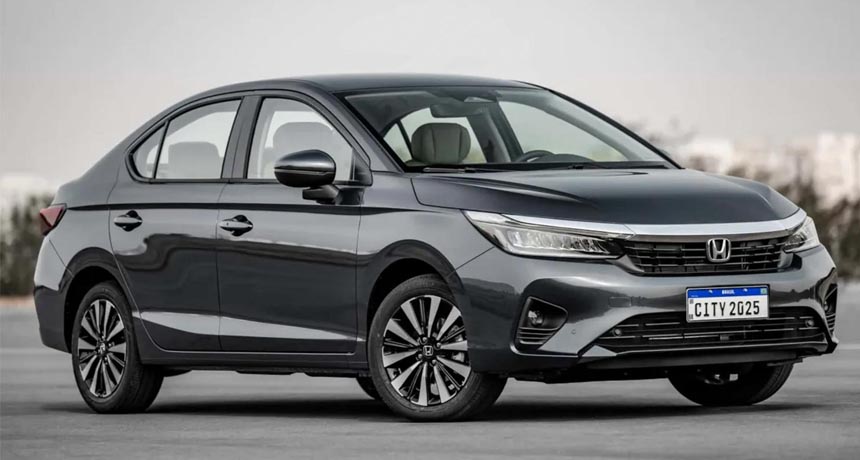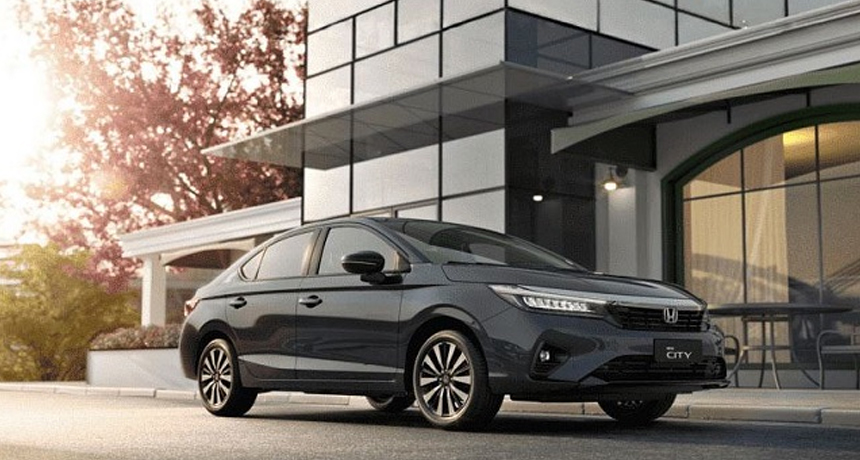
The Honda City has long been the “smart choice” in the subcompact class. For 2025, the City Hatchback continues that reputation with a clever cabin, a city-friendly footprint, and—depending on market—a 1.0-liter VTEC Turbo option that gives it the punch many shoppers want in urban traffic without sacrificing efficiency. Below is a clean, no-nonsense deep dive: specs, features, variants, and realistic pricing guidance, all organized for quick comparison.
Quick context on availability: The City Hatchback is primarily sold in ASEAN markets (e.g., Thailand, Malaysia, Indonesia, the Philippines). The Turbo engine (1.0-liter VTEC Turbo, 122 PS) is available in Thailand; other markets emphasize a 1.5-liter naturally aspirated petrol and/or the e:HEV hybrid. Always check local availability and variant content before you buy.
Highlights at a glance
- Two personalities: sprightly 1.0 VTEC Turbo (Thailand) or smooth 1.5 NA (Malaysia/Philippines) plus the e:HEV hybrid in select markets.
- Ultra-versatile “ULTRA” seats: rear bench folds flat, flips up, or dives to create a genuinely tall/largo cargo bay—one of the most flexible cabins in the class. (Market content varies.)
- Honda SENSING now wider-spread: AEB, lane keep, adaptive cruise (availability by variant/market).
- Real-world efficiency focus: Downsized turbo tuned for torque (173 Nm), or hybrid that prioritizes low-speed EV-like running in traffic.
Core Specifications (Global Overview)
| Item | City Hatchback Turbo (TH) | City Hatchback 1.5 NA (MY/PH)* | City Hatchback e:HEV (TH/MY) |
|---|---|---|---|
| Engine | 1.0L 3-cyl VTEC Turbo | 1.5L 4-cyl i-VTEC (NA) | 1.5L Atkinson-cycle + dual-motor (i-MMD) |
| Max Power | ~122 PS | ~121 PS (varies slightly by market) | System ~109–126 PS eq. (market-rated) |
| Max Torque | 173 Nm | ~145 Nm | Up to ~253 Nm motor torque (market-rated) |
| Transmission | CVT | CVT | e-CVT |
| Drivetrain | FWD | FWD | FWD |
| Suspension | MacPherson strut / Torsion beam | Same | Same |
| Brakes | Disc front / drum or disc rear (variant-dependent) | Same | Same |
| Safety | 6 airbags (typical), ESC, SENSING on mid/high variants | Same | Same |
| Notable | Best torque in lineup; light, eager midrange | Smoother, simpler ownership | Quiet, efficient urban drive |
*Regional ratings/outputs can vary marginally due to local fuels and certification cycles. Turbo availability is primarily Thailand; NA and hybrid specs shown reflect typical Malaysia/Philippines setups.
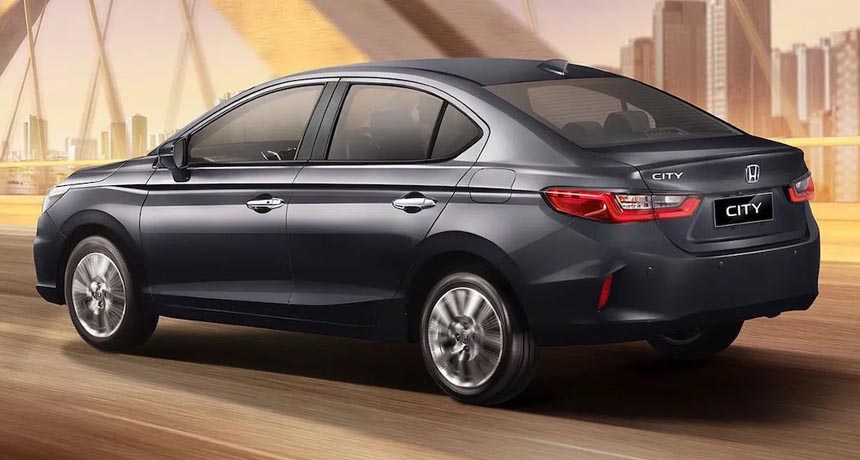
Dimension & Capacity Snapshot
| Dimension | City Hatchback (all powertrains) |
|---|---|
| Length/Width/Height | ~4,34–4,35 m / ~1,75 m / ~1,48 m (market brochures vary slightly) |
| Wheelbase | ~2,60 m |
| Ground Clearance | ~134–150 mm (market dependent) |
| Boot Volume | Competitive for class; expands massively with multi-mode rear seats |
| Fuel Tank | ~40 L |
| Turning Radius | Tight, city-friendly |
(Values are typical for the fifth-gen City Hatchback; always confirm local brochure figures.)
Feature Pack (by theme)
| Theme | Key Equipment (availability by variant/market) |
|---|---|
| Exterior | LED headlamps/DRLs, LED rear lamps, 16–17″ alloys (designs vary), RS styling pack (sportier bumpers/black trims) |
| Cabin & Practicality | “ULTRA” seats (Utility/Long/Tall/Refresh modes), 60:40 split fold, adjustable cargo floor (market-dependent), ample rear legroom, soft-touch panels on higher trims |
| Infotainment | 8″ touchscreen, wired/wireless Apple CarPlay & Android Auto (market dependent), 4–8 speakers, USB-C in newer facelifts |
| Comfort | Auto climate control, rear AC vents (market-specific), smart entry with push-button start, remote start (select variants), one-touch up/down windows |
| Drive & Chassis | Paddle shifters (select trims), ECON mode, turbo torque for low-speed punch (TH), hybrid’s EV-like glide at city speeds |
| Safety & ADAS | Honda SENSING suite: Collision Mitigation Braking (AEB), Lane Keeping Assist, Road Departure Mitigation, Lead Car Departure Notification, Adaptive Cruise (spec varies); 6 airbags typical; VSA, HSA, TPMS |
| RS Flavor | Black roof/door mirrors (select), honeycomb mesh grille, red stitching, sport pedals, rear diffuser design cues |
SENSING availability grew with 2024/2025 facelifts in Thailand and Malaysia—now fitted or optional across more variants, including petrol RS in MY.
Variant & Market Overview (2025)
| Market | Powertrains | Notable Variants | What stands out |
|---|---|---|---|
| Thailand | 1.0 Turbo, e:HEV | S / V / RS (Turbo), e:HEV variants | The only ASEAN market with the Turbo; wide SENSING rollout after the 2024 facelift. |
| Malaysia | 1.5 NA, e:HEV | S / E / V / RS / e:HEV RS | 2024 facelift added RS petrol with SENSING; strong value ladder. |
| Philippines | 1.5 NA (Hatchback), 1.5 NA (Sedan) | City Hatchback, City RS (Sedan) | Hatchback uses 1.5 CVT; sedan updated with SENSING across more trims. |
Realistic Price Windows (2025)
Note: Prices below are manufacturer/dealer guide prices in local currencies, excluding on-road costs unless noted. Exchange rates fluctuate; use local currency as your anchor.
| Market | City Hatchback Entry Price (from) | Typical Spread to Top Spec |
|---|---|---|
| Thailand (Turbo available) | ~THB 599,000 (base) | to ~THB 799,000 depending on trim/e:HEV |
| Malaysia (NA/Hybrid) | ~RM 85,900 (1.5 S) | to ~RM 112,900 (e:HEV RS) |
| Philippines (NA Hatchback) | Varies by dealer/year; hatchback offered above the sedan’s entry band | Focus on spec value; RS is typically at the top for sedans |
Thailand’s official material lists City Hatchback (e:HEV / Turbo) starting from 599,000 THB, with facelift content (SENSING, styling) updated in 2024 and carrying into MY2025. Malaysia’s official pricing ladder for the hatchback spans RM 85,900 to RM 112,900 after the 2024 facelift.
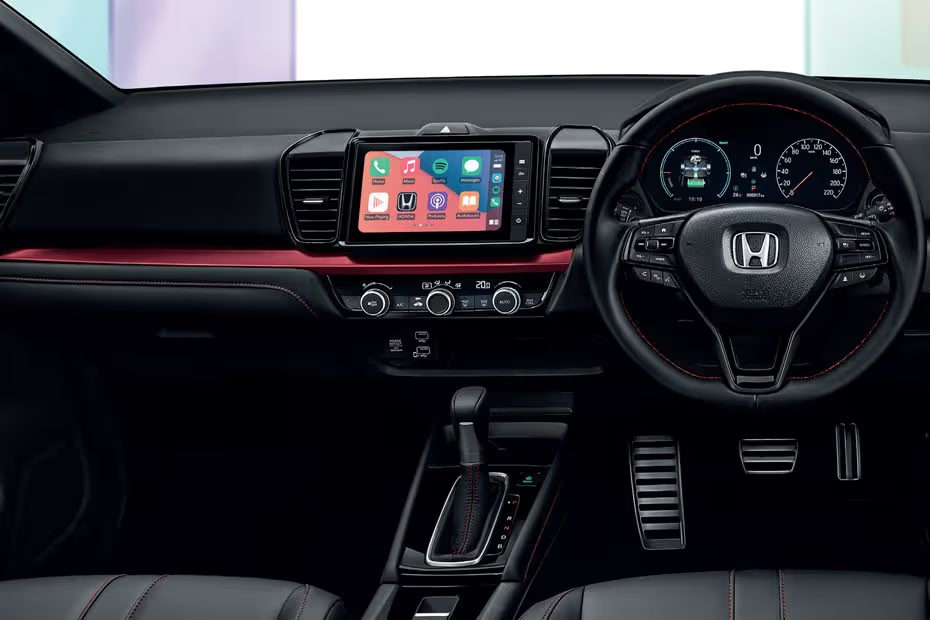
Driving Character: Turbo vs NA vs Hybrid
Turbo (1.0 VTEC Turbo, TH):
If you care about torque at low revs (173 Nm) and frequent overtakes in busy traffic, the turbo shines. The CVT maps keep revs modest, so it feels nippy without sounding strained. On highways, it cruises quietly once you’re at speed. Fuel economy remains a strong suit if you’re light on throttle. (Carz)
1.5 NA (MY/PH):
The naturally aspirated 1.5 is a known quantity—linear, refined, low running complexity, and excellent in stop-go scenarios. Pairing with the CVT is smooth, tuned for economy and calm commuting. It’s less punchy than the turbo but predictably easy to live with.
e:HEV Hybrid (TH/MY):
In crowded cities, the hybrid’s electric-boosted takeoff and frequent engine-off moments deliver a premium feel and outstanding consumption. On open roads, engine engagement is seamless; those coming from larger cars will appreciate the composure.
Why It’s “Hatchback Redefined”
- Space Wizardry: The “ULTRA” rear seat modes transform the cabin from people-mover to micro-van in seconds. Tall mode swallows plants, monitors, or bicycles; Long mode handles flat-pack furniture. It’s a genuine differentiator in the segment.
- Sensible Tech Rollout: Honda SENSING has filtered down to more trims—especially after the 2024 refresh—so you don’t need to splurge for basic AEB and lane support.
- Powertrain Choice That Fits Your Life: Turbo for punchy commutes (TH), NA for simple ownership (MY/PH), Hybrid for ultra-efficiency (TH/MY).
- Quiet Confidence: Ride and NVH are dialed for daily comfort first; RS-grade cosmetics add flair without wrecking the ride.
- Ownership Peace of Mind: Honda’s reputation for durability/resale still looms large in this class (varies by market).
Detailed Equipment Table (Typical 2025 Mix)
Exact trim content varies by market/variant; use this as a shopping checklist.
| Category | What to look for in 2025 City Hatchback |
|---|---|
| Exterior | LED headlamps/DRLs, auto headlamps, RS black accents, 16–17″ alloys, rear spoiler, shark-fin antenna |
| Visibility | Auto wipers (higher trims), power-fold mirrors with indicators, rear camera (multi-view on upper trims), rear sensors |
| Cabin | Fabric or leather-blend (RS), red stitching (RS), leather-wrapped wheel/knob (upper), soft-touch dash panels, ambient lighting (market-dependent) |
| Infotainment | 8″ touch display, wired/wireless CarPlay & Android Auto, Bluetooth, 4–8 speakers, USB-A/USB-C mix, steering-wheel audio controls |
| Convenience | Smart entry, push-start, remote start (select), walk-away auto lock, one-touch windows, rear AC vents (market-dependent), multiple cupholders & cubbies |
| Seating & Cargo | ULTRA seats (Utility/Long/Tall/Refresh modes), 60:40 split, height-adjust driver seat, ISOFIX rear anchors |
| Drive Aids | Econ mode, paddle shifters (select), cruise control or Adaptive Cruise (SENSING variants) |
| Safety | 6 airbags (typical), ABS, EBD, VSA, HSA, TPMS, Honda SENSING suite (AEB, LKAS, RDM, ACC, Lead Car Departure Notification), emergency stop signal |
| Wheels/Tyres | 185/60 R15 up to 215/50 R17 depending on trim (market hardware differs) |
| Warranty | Market standard (e.g., 5 years in MY; hybrid battery terms differ) |
ADAS breadth and exact wheel/tire spec depend on market and facelift level. Thailand’s facelift expanded SENSING; Malaysia’s 2024 update added SENSING to all five variants, including petrol RS.
Pros & Cons (2025)
What you’ll love
- Cabin flexibility that rivals mini-MPVs.
- City-friendly size with adult-friendly rear legroom.
- Broad safety net with SENSING on more trims post-facelift.
- Turbo option (Thailand) offers class-competitive torque without a big fuel penalty.
- Hybrid delivers premium smoothness and stellar efficiency in urban use.
What to watch
- Feature content varies a lot by country and trim—confirm the exact spec at order time.
- Rear disc brakes are not universal across all trims in every market.
- NA 1.5 is competent, but enthusiasts will prefer the Turbo/Hybrid punch.
- Hatchback availability is regional; some countries only get the sedan.
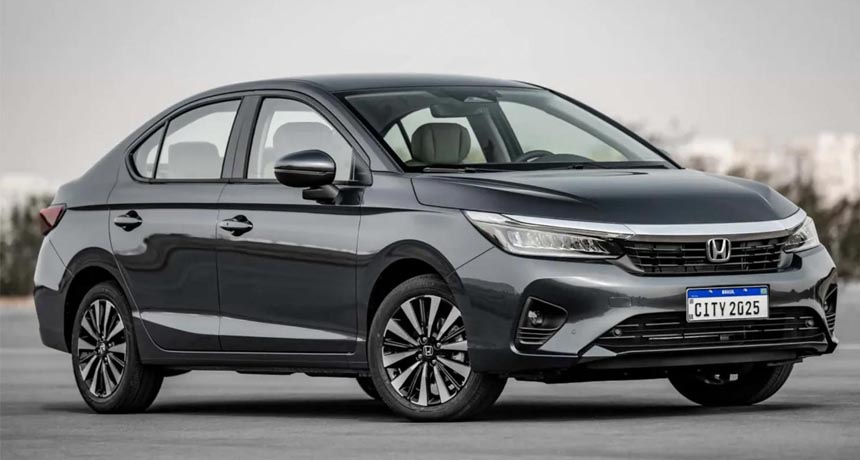
Buyer’s Guide Tips
- Choosing your engine:
- Spec sweet spot: In markets with RS petrol + SENSING (e.g., Malaysia), this trim often balances safety, style, and value neatly.
- Price check: Thailand’s Turbo lineup starts around THB 599,000 and stretches near THB 799,000 as you move to higher/e:HEV trims; Malaysia spans RM 85,900–RM 112,900. Budget for registration, insurance, and accessories separately.
- Pakistan note: As of 2025, the City Hatchback isn’t officially offered; the local City remains a sedan with NA engines. If you’re in Pakistan and want a practical small Honda, keep an eye on regional imports or consider similarly sized hatchbacks officially on sale.
One-screen Summary Table
| Topic | Summary |
|---|---|
| What it is | A subcompact hatchback alternative to the City sedan with ingenious interior flexibility and a wide spread of modern safety tech. |
| Engines (by market) | 1.0 VTEC Turbo (Thailand), 1.5 NA (Malaysia/Philippines), e:HEV hybrid (Thailand/Malaysia). |
| Power/Torque | Turbo ~122 PS/173 Nm; NA ~121 PS/145 Nm; Hybrid system up to ~253 Nm motor torque (ratings vary). |
| Gearbox | CVT (Turbo/NA), e-CVT (Hybrid). |
| Strengths | Space magic (ULTRA seats), easy to drive/park, strong safety offering post-facelift, efficient across the board. |
| Weak points | Spec variability by market; enthusiasts may want more bite from the NA; rear discs not universal. |
| Price sense (2025) | TH: ~THB 599k–799k (Turbo/e:HEV range). MY: ~RM 85.9k–112.9k. PH hatchback sits above entry sedan pricing; confirm locally. |
| Best for | Urban families, new drivers, and anyone who wants a small car that can do big-item hauling on weekends. |
| Alternatives | Toyota Yaris/Yaris Ativ (market-dependent), Mazda2 hatch, Nissan Almera (sedan), Proton X50 (if you’re pivoting to compact crossovers). |
